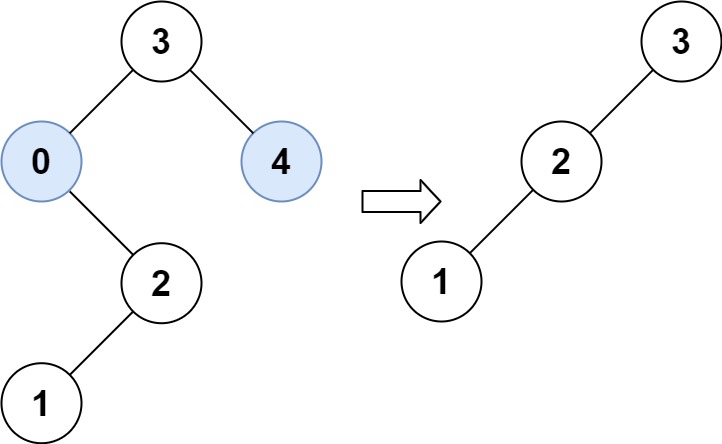题目¶
原题地址:https://leetcode.com/problems/trim-a-binary-search-tree/
Given the root of a binary search tree and the lowest and highest boundaries as low and high, trim the tree so that all its elements lies in [low, high]. Trimming the tree should not change the relative structure of the elements that will remain in the tree (i.e., any node's descendant should remain a descendant). It can be proven that there is a unique answer.
Return the root of the trimmed binary search tree. Note that the root may change depending on the given bounds.
Example 1:

Input: root = [1,0,2], low = 1, high = 2 Output: [1,null,2]
Example 2:

Input: root = [3,0,4,null,2,null,null,1], low = 1, high = 3 Output: [3,2,null,1]
Example 3:
Input: root = [1], low = 1, high = 2 Output: [1]
Example 4:
Input: root = [1,null,2], low = 1, high = 3 Output: [1,null,2]
Example 5:
Input: root = [1,null,2], low = 2, high = 4 Output: [2]
Constraints:
- The number of nodes in the tree in the range [1, 104].
- 0 <= Node.val <= 104
- The value of each node in the tree is unique.
- root is guaranteed to be a valid binary search tree.
- 0 <= low <= high <= 104
解法¶
遍历二叉树,在遍历的过程中重建二叉树,将不满足条件的节点删除( 节点的值必须满足 low <= value <= high ):
- 如果当前节点的值 < low,那么根据 BST 的特性可知,它的左子树肯定也都 < low,此时需要用右子树代替当前节点的位置。
- 如果当前节点的值 > high,那么根据 BST 的特性可知,它的右子树肯定也都 > high,此时需要用左子树代替当前节点的位置。
这个方法的 Python 代码类似下面这样:
# Definition for a binary tree node.
# class TreeNode(object):
# def __init__(self, val=0, left=None, right=None):
# self.val = val
# self.left = left
# self.right = right
class Solution(object):
def trimBST(self, root, low, high):
if root is None:
return
if root.val < low:
# 舍弃当前节点和它的左子树,因为左子树各节点的值肯定 < low
root = self.trimBST(root.right, low, high)
elif root.val > high:
# 舍弃当前节点和它的右子树,因为右子树各节点的值肯定 > high
root = self.trimBST(root.left, low, high)
else:
root.left = self.trimBST(root.left, low, high)
root.right = self.trimBST(root.right, low, high)
return root
Comments